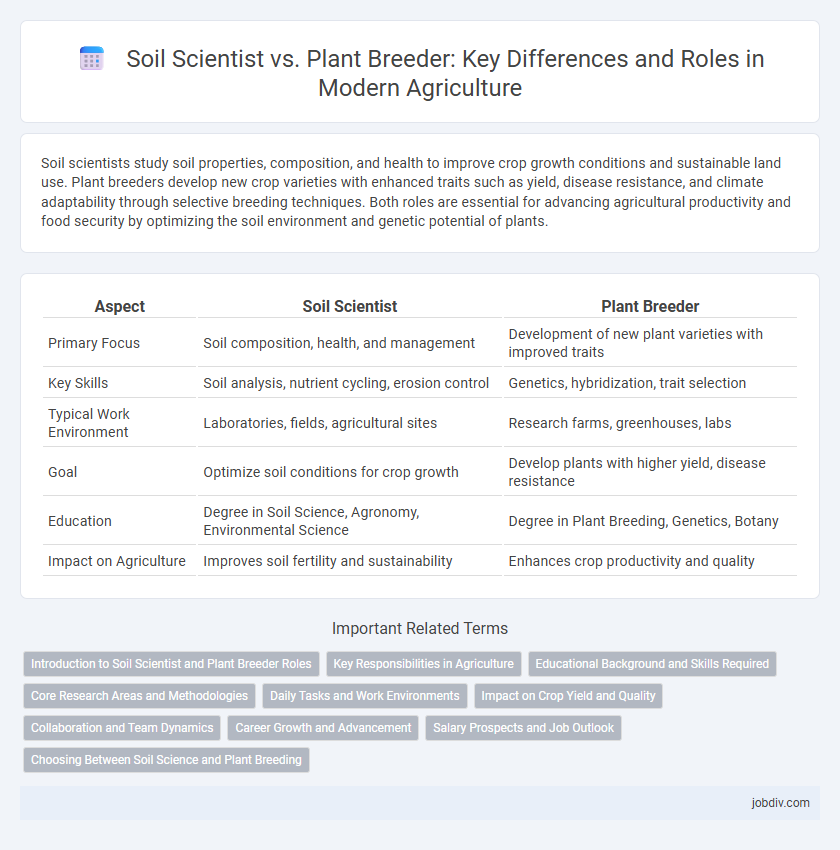Soil scientists study soil properties, composition, and health to improve crop growth conditions and sustainable land use. Plant breeders develop new crop varieties with enhanced traits such as yield, disease resistance, and climate adaptability through selective breeding techniques. Both roles are essential for advancing agricultural productivity and food security by optimizing the soil environment and genetic potential of plants.
Table of Comparison
| Aspect | Soil Scientist | Plant Breeder |
|---|---|---|
| Primary Focus | Soil composition, health, and management | Development of new plant varieties with improved traits |
| Key Skills | Soil analysis, nutrient cycling, erosion control | Genetics, hybridization, trait selection |
| Typical Work Environment | Laboratories, fields, agricultural sites | Research farms, greenhouses, labs |
| Goal | Optimize soil conditions for crop growth | Develop plants with higher yield, disease resistance |
| Education | Degree in Soil Science, Agronomy, Environmental Science | Degree in Plant Breeding, Genetics, Botany |
| Impact on Agriculture | Improves soil fertility and sustainability | Enhances crop productivity and quality |
Introduction to Soil Scientist and Plant Breeder Roles
Soil scientists analyze soil composition, structure, and nutrient content to optimize agricultural productivity and environmental sustainability. Plant breeders develop new crop varieties by selecting and crossbreeding plants to enhance traits such as yield, disease resistance, and drought tolerance. Both roles are critical for advancing agricultural innovation and ensuring food security through improved soil management and crop genetics.
Key Responsibilities in Agriculture
Soil scientists analyze soil composition, fertility, and structure to optimize crop production and sustainable land use. Plant breeders develop new plant varieties by selecting traits for higher yield, disease resistance, and environmental adaptability. Both roles collaborate to enhance agricultural productivity through improved soil management and genetically superior crops.
Educational Background and Skills Required
Soil scientists typically hold degrees in soil science, agronomy, or environmental science, emphasizing knowledge of soil chemistry, physics, and biology essential for analyzing and managing soil resources. Plant breeders usually possess education in genetics, plant biology, or biotechnology, focusing on skills in genetic analysis, crop improvement, and plant physiology to develop high-yield, disease-resistant varieties. Both professions require strong analytical abilities, proficiency in data interpretation, and experience with laboratory techniques or field research.
Core Research Areas and Methodologies
Soil scientists focus on analyzing soil composition, nutrient cycles, and soil health to enhance crop productivity and sustainability, employing techniques such as soil sampling, laboratory analysis, and remote sensing technologies. Plant breeders concentrate on genetic improvement of crops through selective breeding, molecular markers, and biotechnological tools to develop disease-resistant, high-yield, and climate-resilient plant varieties. Both disciplines integrate field experiments and data modeling, but soil science emphasizes environmental interactions while plant breeding targets genetic advancements.
Daily Tasks and Work Environments
Soil scientists analyze soil composition, fertility, and conservation methods to optimize crop production, often working outdoors in fields or laboratories conducting soil sampling and testing. Plant breeders focus on developing new crop varieties through genetic selection and hybridization, typically spending time in greenhouses, research facilities, and experimental farms. Both professions require collaboration with agronomists and farmers but differ in their primary focus on soil ecosystems versus plant genetics.
Impact on Crop Yield and Quality
Soil scientists analyze soil properties and nutrient availability to optimize conditions for crop growth, directly influencing crop yield and quality by improving soil health and fertility. Plant breeders develop new crop varieties with enhanced traits such as disease resistance, drought tolerance, and higher nutritional value, contributing to increased crop productivity and quality. The combined efforts of soil scientists and plant breeders create a synergistic impact on agricultural output and food quality.
Collaboration and Team Dynamics
Soil scientists and plant breeders collaborate closely to optimize crop production by integrating soil health data with plant genetics. Their teamwork enhances agricultural sustainability through improved soil fertility and crop resilience. Effective communication between these experts fosters innovative solutions for better resource management and increased yield.
Career Growth and Advancement
Soil scientists and plant breeders both experience strong career growth driven by increasing demand for sustainable agriculture and food security. Soil scientists advance by specializing in areas like soil health assessment and environmental impact analysis, while plant breeders progress through genetic improvement techniques and biotechnology applications to develop high-yield, disease-resistant crops. Career advancement in both fields often involves research leadership roles, collaboration with agribusiness firms, and contributions to policy development for agricultural innovation.
Salary Prospects and Job Outlook
Soil scientists typically earn an average salary ranging from $55,000 to $90,000 annually, with strong demand driven by environmental conservation and sustainable land management efforts. Plant breeders can expect salaries between $60,000 and $100,000, benefiting from growth in agricultural biotechnology and crop improvement industries. Both professions offer favorable job outlooks, but plant breeders may experience higher salary potential due to advancements in genetic research and commercial seed development.
Choosing Between Soil Science and Plant Breeding
Choosing between soil science and plant breeding involves evaluating career goals related to agriculture's foundational elements versus crop improvement strategies. Soil scientists analyze soil properties, fertility, and management practices to optimize land use and sustainability, while plant breeders focus on developing new crop varieties with enhanced yield, disease resistance, and climate adaptability through genetic techniques. Understanding one's interest in either ecosystem management or genetic innovation is crucial for making an informed decision between these specialized agricultural fields.
Soil Scientist vs Plant Breeder Infographic

 jobdiv.com
jobdiv.com